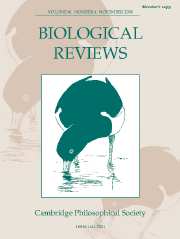Crossref Citations
This article has been cited by the following publications. This list is generated based on data provided by
Crossref.
White, Craig R.
and
Seymour, Roger S.
2005.
Allometric scaling of mammalian metabolism.
Journal of Experimental Biology,
Vol. 208,
Issue. 9,
p.
1611.
Glazier, Douglas S.
2005.
Beyond the ‘3/4‐power law’: variation in the intra‐and interspecific scaling of metabolic rate in animals.
Biological Reviews,
Vol. 80,
Issue. 4,
p.
611.
Long, Zachary T.
and
Morin, Peter J.
2005.
Effects of organism size and community composition on ecosystem functioning.
Ecology Letters,
Vol. 8,
Issue. 12,
p.
1271.
NIKLAS, KARL J.
2006.
Plant Allometry, Leaf Nitrogen and Phosphorus Stoichiometry, and Interspecific Trends in Annual Growth Rates.
Annals of Botany,
Vol. 97,
Issue. 2,
p.
155.
Anfodillo, Tommaso
Carraro, Vinicio
Carrer, Marco
Fior, Claudio
and
Rossi, Sergio
2006.
Convergent tapering of xylem conduits in different woody species.
New Phytologist,
Vol. 169,
Issue. 2,
p.
279.
Fehrmann, Lutz
and
Kleinn, Christoph
2006.
General considerations about the use of allometric equations for biomass estimation on the example of Norway spruce in central Europe.
Forest Ecology and Management,
Vol. 236,
Issue. 2-3,
p.
412.
NIKLAS, KARL J.
COBB, EDWARD D.
and
MARLER, THOMAS
2006.
A Comparison between the Record Height-to-Stem Diameter Allometries of Pachycaulis and Leptocaulis Species.
Annals of Botany,
Vol. 97,
Issue. 1,
p.
79.
Scrosati, Ricardo
2006.
Length–biomass allometry in primary producers: predominantly bidimensional seaweeds differ from the “universal” interspecific trend defined by microalgae and vascular plants.
Canadian Journal of Botany,
Vol. 84,
Issue. 7,
p.
1159.
Warton, David I.
Wright, Ian J.
Falster, Daniel S.
and
Westoby, Mark
2006.
Bivariate line‐fitting methods for allometry.
Biological Reviews,
Vol. 81,
Issue. 2,
p.
259.
Niklas, Karl J.
and
Spatz, Hanns‐Christof
2006.
Allometric theory and the mechanical stability of large trees: proof and conjecture.
American Journal of Botany,
Vol. 93,
Issue. 6,
p.
824.
Niklas, K. J.
2006.
Scaling the paths of resistance.
New Phytologist,
Vol. 169,
Issue. 2,
p.
219.
NIKLAS, KARL J.
and
COBB, EDWARD D.
2006.
Biomass partitioning and leaf N,P – stoichiometry: comparisons between tree and herbaceous current‐year shoots.
Plant, Cell & Environment,
Vol. 29,
Issue. 11,
p.
2030.
Westoby, Mark
and
Wright, Ian J.
2006.
Land-plant ecology on the basis of functional traits.
Trends in Ecology & Evolution,
Vol. 21,
Issue. 5,
p.
261.
Niklas, Karl J.
2006.
A phyletic perspective on the allometry of plant biomass‐partitioning patterns and functionally equivalent organ‐categories.
New Phytologist,
Vol. 171,
Issue. 1,
p.
27.
Hui, Dafeng
and
Jackson, Robert B.
2007.
Uncertainty in allometric exponent estimation: A case study in scaling metabolic rate with body mass.
Journal of Theoretical Biology,
Vol. 249,
Issue. 1,
p.
168.
Coomes, David A
Jenkins, Kerry L
and
Cole, Lydia E.S
2007.
Scaling of tree vascular transport systems along gradients of nutrient supply and altitude.
Biology Letters,
Vol. 3,
Issue. 1,
p.
87.
COOMES, DAVID A.
and
ALLEN, ROBERT B.
2007.
Effects of size, competition and altitude on tree growth.
Journal of Ecology,
Vol. 95,
Issue. 5,
p.
1084.
Enquist, Brian J.
Tiffney, Bruce H.
and
Niklas, Karl J.
2007.
Metabolic Scaling and the Evolutionary Dynamics of Plant Size, Form, and Diversity: Toward a Synthesis of Ecology, Evolution, and Paleontology.
International Journal of Plant Sciences,
Vol. 168,
Issue. 5,
p.
729.
Rucker, R. B.
2007.
Allometric scaling, metabolic body size and interspecies comparisons of basal nutritional requirements*.
Journal of Animal Physiology and Animal Nutrition,
Vol. 91,
Issue. 3-4,
p.
148.
Niklas, Karl J.
Cobb, Edward D.
Niinemets, Ülo
Reich, Peter B.
Sellin, Arne
Shipley, Bill
and
Wright, Ian J.
2007.
“Diminishing returns” in the scaling of functional leaf traits across and within species groups.
Proceedings of the National Academy of Sciences,
Vol. 104,
Issue. 21,
p.
8891.

